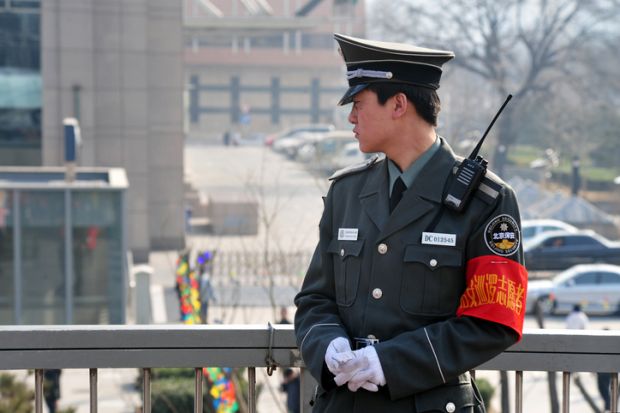A “sudden spike” in attacks on academics and students in China is among the trends putting academic freedom at increasing risk globally, according to new research.
Free to Think 2019, the annual report from the Scholars at Risk network, details 324 attacks on universities, their staff and students across 56 countries in 2018-19, compared with 294 in the preceding 12 months.
Clare Robinson, SAR’s advocacy director, told Times Higher Education that the report “captures only a small, albeit growing, sample of attacks on higher education communities occurring worldwide”.
Twenty-six of the incidents listed occurred in China, up from 20 in 2017-18, which “may in part be due to the intensified crackdown on student activists, including members of campus ‘Marxist’ groups and those advocating for better factory worker conditions,” Ms Robinson said.
The report documents cases of professors who lost jobs or were even imprisoned, including those who faced professional retaliation “after being reported to [Communist] Party officials by so-called student informants”. Ms Robinson added that repression of student activism reached a level “not seen in mainland China for many years”.
“Should these pressures continue to build and should more universities reconsider their partnerships with Chinese academic institutions, Chinese university reputations could indeed take a hit,” she said. “Given China’s important role on the world stage and the academic potential China’s scholars and students offer, we all have a reason to press government and higher education authorities – in and outside China – to ensure academic freedom, institutional autonomy, and other values we should expect of ‘world-class’ universities.”
In India, the number of incidents rose from 13 to 22, as national political tensions manifested into on-campus conflicts. Some have resulted in violence, property damage, campus closures, and the arrests of both scholars and students. “While these types of incidents are not necessarily new, the volume of attacks in India in recent years warrants a closer look at challenges facing scholars and students in the country,” the report says.
Concerns about the US stand out in a report whose incidents are otherwise mostly in non-democratic or developing nations. “Over the past year, US authorities have denied or cancelled visas of a number of Chinese students and scholars, apparently based on sweeping allegations of scientific espionage and intellectual property theft,” Ms Robinson said. “US authorities have also blocked scholarly travel in retaliation for other nonviolent expression related to Palestine.”
POSTSCRIPT:
Print headline: ‘Sudden spike’ in attacks on HE in China
Register to continue
Why register?
- Registration is free and only takes a moment
- Once registered, you can read 3 articles a month
- Sign up for our newsletter
Subscribe
Or subscribe for unlimited access to:
- Unlimited access to news, views, insights & reviews
- Digital editions
- Digital access to THE’s university and college rankings analysis
Already registered or a current subscriber?







